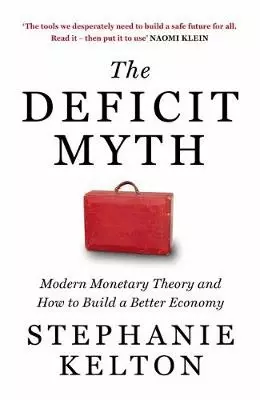The Deficit Myth
Stephanie Kelton
"The Deficit Myth", Stephanie Kelton
Stephanie Kelton is right. Any society can afford expenditure for whatever it can produce, not limited by an artificial financial budget constraint. Humanity should not be constrained by its own artefact of money. Real resources of labour, raw materials, technology and time are what enable and constrain our expenditure and consumption, not money, which as Kelton points out, we can easily create. Applying the household model of a balanced budget is a category error at national macroeconomic level for governments who are currency issuers.
There’s room for debate on some finer points of the argument. MMT tends to insist that governments should issue money as debt, typically by the sale of government bonds. According to MMT, this is then balanced by surpluses in the two other personal and overseas sectors of the financial economy, applying Wynne Godley’s identity which sums the financial balances of the three sectors to zero. This is open to challenge, because of the tendency to wrongly use the identity as a causal equation. It’s trivial to show that, if money is issued as debt, then all money balances must add to zero. But this doesn’t capture how the economy works. It leads to the oversimplification of an economic model of buckets with cash balances being poured between them. In fact, any shift in an economic variable will lead to complex shifts through consumption, production, and investment functions, generating changes in employment, output, price, wage etc. MMT avoids, but needs, a comprehensive macroeconomic model to work through its proposals. It’s surely easier to issue money without creating matching debt, which Kelton does allow as a possibility, hence removing any need for a dubious application of the Godley identity?
Job guarantee which Kelton advocates is not an inevitable proposal within MMT. It looks administratively cumbersome if 12-15 million people are to be employed. It can too easily become ‘workfare’ where people’s living is conditional on compliance. And it suggests a ‘gig economy’ if, as Kelton proposes, people move into and out of the program as economies contract or grow. But the biggest worry is that technology may simply render more jobs redundant. Even now there is substantial employment in the system, but inadequate income. In this case, basic income (UBI) is a more effective means of ensuring people’s livelihood, and is a proposal MMT should embrace.
It’s also not essential to the argument to insist that money derives value from the government imposing taxation in the currency, rather than because everyone trusts money to have recall over goods, services, labour, assets and raw materials. Kelton mentions the game of Monopoly, and here the bank just issues debt-free money to the players who respect its value for transactions.
Kelton is also ultimately right that the real US deficits are in healthcare, education, infrastructure, climate and democracy. What is now needed is an MMT resource-costed programme of expenditure over several years to meet these real deficits whether by Job Guarantee, UBI, Medicare for all, Green New Deal etc. It should prove an electoral winner.
The book is available here.
Geoff Crocker
Editor ‘The Case for Universal Basic Income’
www.ubi.org

